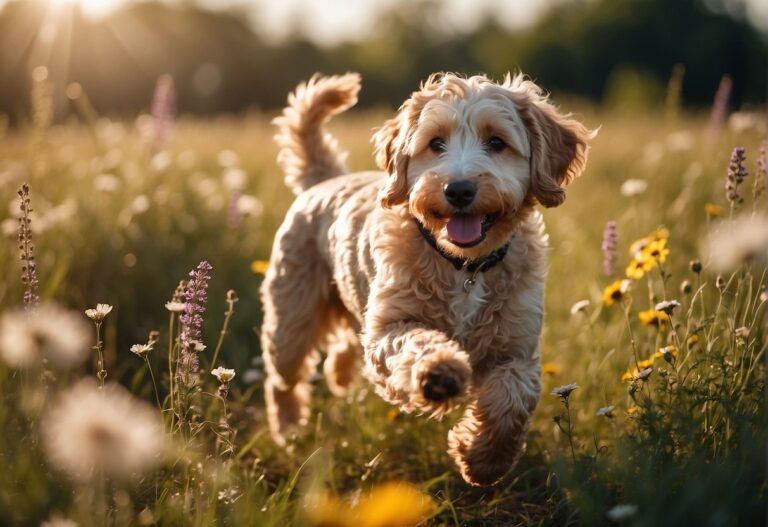Petite Goldendoodle Essentials: Top Care Tips for Your Little Furry Friend

The Petite Goldendoodle is a charming and increasingly popular hybrid dog breed known for combining the gentle nature of the Golden Retriever with the intelligence and hypoallergenic coat of the Poodle. Often included in the mix is the Cocker Spaniel, contributing to the smaller size and varied coat types of the Petite Golden Poodle. This breed possesses a playful and affectionate temperament, making it an excellent choice for families and individuals. Their smaller stature makes them particularly well-suited for apartment living or those with limited space.
One of the most appealing characteristics of the Petite Goldendies is its coat, which can range in texture from curly to wavy and requires regular maintenance to keep it in good condition. Prospective owners should take note of the health considerations that come with the breed, as Goldendoodles may inherit conditions prevalent in their parent breeds.
Finding a reputable breeder is essential when considering a Petite Golden Puppy to ensure that health, temperament, and size expectations are met. By selecting a responsible breeder, you aid in promoting the health and longevity of your future pet.
- The Petite Goldendoodle is an affectionate and adaptable hybrid suitable for various living situations.
- Regular grooming and attention to health are important for maintaining the well-being of Petite Dogs.
- Choosing a reputable breeder is crucial for bringing a healthy and well-tempered Petite Golden Poodle into your home.
Breed Overview Of Petite Goldendoodle
The Tiny Goldendoodle combines a Golden Retriever’s friendly nature with a Poodle’s intelligence in a smaller package. This guide explores all aspects of the breed, giving you specifics on its origins, appearance, temperament, and health.
Origins of the Petite Goldendoodle Puppies
The Petite Golden Poodle is a crossbreed, a blend of the Golden Retriever, Poodle, and often the Cocker Spaniel to achieve a smaller size. Breeders initially designed standard Goldendoodles to combine the gentle temperament of the Golden Retriever with the Poodle’s hypoallergenic coat. Petite Doodles came later, as breeders aimed for a more compact version suitable for smaller living spaces.
Characteristics & Appearance
Height: 10-18 inches Weight: 15-40 pounds Coat Colors: can include shades like golden, cream, red, apricot, black, and white.
Petite Doodles possess a mixture of their parent breeds’ physical traits. They have a variable coat, which can range from wavy to curly, and come in various colours, including rare patterns like a party. Their size categorizes them among small to medium-sized dogs.
Temperament and Behavior Of Petite Goldendoodle
Petite Poodles are known for their friendly, affectionate, and intelligent nature. They are playful and can be mischievous, needing regular interaction and mental stimulation. Typically, they are excellent as family pets and get along well with children and other animals.
Health & Life Expectancy
Lifespan: 10-15 years
Like all breeds, Petite Golden Poodles can be prone to specific health issues, such as progressive retinal atrophy and patellar luxation. Regular check-ups with a veterinarian can help in early detection and management of such conditions. Their lifespan can be extended with proper care and a healthy lifestyle.
Petite Goldendoodle Varieties
There are different types of Petite Retriever Breed, such as F1, F1b, and F2. Each type varies in terms of genetic makeup:
- F1: 50% Golden Retriever + 50% Poodle
- F1b: 75% Poodle + 25% Golden Retriever
- F2: An F1 Goldendoodle bred back to an F1 Goldendoodle
These classifications help potential owners and breeders understand the traits and characteristics that can be expected in the puppies.
Adaptability to Living Environments
Petite Golden-doodles are highly adaptable. They are generally comfortable in both apartments and houses as long as they receive sufficient exercise and mental stimulation. Their energy levels are considerable, requiring regular physical activity to remain content and healthy.
Hypoallergenic Properties
A key feature that makes Petite Goldies popular is their hypoallergenic coat, which typically results in lower shedding. This can make them a suitable option for individuals with allergies, but sensitivity varies, so spending time with the breed before committing is advisable.
Also Read: Micro Mini Goldendoodle – CharmingTiny Designer Dogs
Care and Management
Proper care and management of your Petite Golden breed are critical for its well-being. Understanding the specific needs in diet, exercise, grooming, training, socialization, and health maintenance ensures your dog leads a happy and healthy life.
Diet and Nutrition
Your Petite Golden-doodle requires a well-balanced diet that’s rich in nutrients to support their energetic lifestyle. Opt for high-quality dog food that caters to their size and energy levels. Feed measured amounts twice daily to prevent overfeeding. Remember, treats should only be given sparingly and count towards their daily caloric intake.
Exercise Requirements
Exercise is vital for maintaining the health of your energetic Petite Golden Dog. Aim for at least 30 minutes of activity daily, which can involve walks, playtime, or visits to the dog park. Ensure that exercises are safe to prevent damage to their developing joints, especially in puppies.
Grooming Needs
Grooming your Petite Golden-doodle is essential due to its wavy and thick coat that can easily mat. Regular brushing several times a week and a monthly bath will keep their coat in good condition. Pay attention to their ears to avoid infection and trim their nails regularly to prevent discomfort.
Training and Socialization
These intelligent dogs are easy to train, thriving on positive reinforcement. Early obedience training is recommended. Socialization with other animals, pets, kids, and strangers helps develop well-rounded behaviour. Use treats and praises to reward good behaviour during training sessions.
Health Maintenance
Routine visits to your veterinarian are important for keeping your Petite Golden Poodle healthy. Screen for common breed-specific health issues like patellar luxation and progressive retinal atrophy. Maintain a record of vaccinations and preventive treatments to safeguard against potential health issues.
Choosing a Goldendoodle
Selecting a Goldendoodle involves finding trustworthy breeders, considering the right puppy for your needs, and understanding how a petite doodle can fit into your family as a beloved companion.
Finding a Reputable Breeder
To ensure you’re getting a healthy and well-tempered Goldendoodle, it’s crucial to find a reputable breeder. A good breeder will provide detailed info on the puppy’s lineage, health clearances, and socialization practices. Check for breeders who specialize in petite Goldendoodles, as they should have specific knowledge about the breed’s size and needs.
- Research: Look for breeders with positive reviews and recommendations.
- Questions to Ask: Inquire about testing for genetic disorders and the parent dogs’ temperaments.
Selecting a Puppy
Choosing a puppy is more than falling in love at first sight. Observe the puppies’ temperaments and how they interact with their littermates and people. A petite Goldendoodle’s temperament often includes friendliness, intelligence, and an eagerness to please, making them an ideal family pet.
- Meet the Puppies: Spend time with the litter to observe behaviours and personalities.
- Health Checks: Ensure the puppy has had all necessary health evaluations.
Considerations for Families and Owners
When bringing a Goldendoodle into your home, consider your living situation, the time you can dedicate to companionship and training, and the long-term commitment, as their lifespan can be 10-15 years.
- Space: Petite Goldendoodles can adapt to various living spaces, including apartments.
- Compatibility: Their affectionate nature makes them excellent companions for children and those seeking a loyal companion.
Remember, the aim is to find a dog that will become an integral and loving member of your family for years to come.
Also Read: Guide to White Mini Goldendoodle – Size, Care, and Traits
Frequently Asked Questions
The Petite Goldendoodle combines traits from its parent breeds, producing a family-friendly pet. Here, we address common inquiries about their size, health, and overall care.
What is the typical size and weight of a fully-grown Petite Goldendoodle?
A fully-grown Petite Puppy typically weighs between 10 to 20 pounds. Their size is conducive to apartment living and makes them ideal for small living spaces.
How do Petite Goldendoodles differ from Mini Goldendoodles in terms of size and temperament?
They are generally smaller than Mini Goldendoodles, with the former adding a sprinkle of Cocker Spaniel in the mix. This often results in a more manageable size for smaller homes, without significant differences in their friendly and loving temperament.
What are the common health concerns associated with Petite Goldendoodles?
Petite Golden-doodles may face typical health concerns like their larger counterparts, including hip dysplasia, ear infections, and allergies. Regular veterinary check-ups are crucial for maintaining their health.
What should potential owners expect to spend on a Petite Golden-doodle puppy?
The cost of a Petite Goldendoodle puppy varies, but expect to pay a premium due to their desirable size and hypoallergenic coat. Pricing often reflects the breeder’s reputation and the puppy’s lineage.
How can one find reputable Petite Goldendoodle breeders?
To find reputable breeders, consider those who transparently share health clearances and allow visits to see the puppies’ environment. Networking with Goldendoodle communities and checking reviews can also be helpful.
What is the maintenance and grooming required for a Petite Goldendoodle?
They require regular grooming, including brushing a few times a week to prevent matting. Their low-shedding coat makes them popular among allergy sufferers, but it does necessitate professional grooming services every few months.
Veterinary Perspectives
As a vet, I’ve seen many Micro Mini Goldendoodles come through my practice. They’re generally healthy dogs, but like all breeds, they have their quirks. Keep an eye on their ears for infections, watch their weight to prevent joint issues, and don’t skimp on dental care. Regular check-ups are key – we can catch potential problems early and keep your pup in top shape. Remember, prevention is always better (and cheaper) than cure!






